The Tunisian olive oil evangelist
Path #10: Why Sarah Ben Romdane pivoted from journalism to olive oil.
In this edition of Desire Paths…
Sarah Ben Romdane was a journalist in Paris when the pandemic guided her back to Tunisia—where she spent glorious summers as a kid and where her family produced olive oil for generations. Today, Tunisian olive oil is a hidden workhorse in the industry and often mixed with oil from other countries. But Sarah saw an opportunity to create a new-generation brand that proudly shouts its Tunisian terroir origins. It’s called KAÏA. Here’s her story.
I’m Danny Giacopelli, an editorial director, photographer, traveller and small business fan. By day I tell stories for Courier magazine. This is my personal newsletter, Desire Paths. It’s based on the idea that the most fulfilled, fascinating people in the world chase after risky dreams, change careers, make unconventional decisions, and cross oceans to start something new. I go deep with them—small business owners, designers, shopkeepers, farmers, billionaires, hermits, maybe even you—and share everything I learn.
Path #10: Sarah Ben Romdane
“I think I had to feel miserable to remember what it is that makes me happy and fulfilled. And so to find inspiration and joy again, I booked a ticket to Tunisia.”
Where does your olive oil come from? Italy? Greece? Spain? If so, there’s a chance that a portion of your olive oil is actually Tunisian, too.
The Tunisian olive oil industry is ancient and also one of the world’s largest. But it’s always faded into the background in terms of prestige and awareness, compared to Europe’s more well-known exporters.
Journalist Sarah Ben Romdane was raised in Paris and spent summers in Tunisia, where her family maintained olive estates for generations. In 2020, at the beginning of Covid, Sarah moved to Tunisia for what she thought would be a brief stint. It’s a story we’re probably all familiar with. (How long can this Covid thing possibly last? Two months, tops?). In Sarah’s case, the pandemic didn’t turn her into a sourdough-baking whiz or a board games fanatic—instead, it provided the opportunity for her to pivot away from journalism and launch her own Tunisian olive oil brand, KAÏA.
Last year, Courier ran a short, great case study on KAÏA, digging into business challenges and learnings. (Definitely read that piece if you want some actionable insights.) Learning about Sarah’s business made me want to know even more about her own personal life journey, her decisions, motivations and inspirations. So… I gave her a ring to find out.
Maybe there’s an overlooked industry back in your home city or country? An underinvested craft, an intriguing and potentially lucrative market gap, a professional calling practically shouting your name…
—DG
The makings of a journalist
I was born in Paris and I lived there until I was 13, then I moved to London and lived there until I was 24. I know I don’t really sound British, but I was there for quite a long time! My father is from Tunisia and my mother is from Syria, so I grew up in a very multicultural family, feeling very much integrated into French culture, but also attached to my roots.
As a kid, I always wanted to do something that had meaning and a purpose. I wanted to change the world. My great grandfather from my paternal side was in politics and was exiled from Tunisia. And my grandfather from my mother’s side was in diplomacy. So I’ve always had a curiosity for global politics and I studied political science. Eventually, I realized a career in politics wasn’t for me, but I still wanted to make a difference and create more fair relationships between countries—maybe even the countries where I came from and the countries where I grew up.
I realized I could be a journalist. I could tell stories and bring more representation on a global scale. So I studied for a master’s in journalism after my bachelor’s in international politics. I’ve always had a passion for storytelling and representation and a commitment to social justice and activism. These have driven my choices and my vision—and also my brand today.
But what makes me truly happy?
My first and only job prior to launching KAÏA was for a young media startup called MILLE that’s based in Dubai. I was working for them from Paris for three years. Then Covid happened—and I was miserable, isolating in Paris alone, and feeling very anxious, like many people. This period made realize that what I really wanted to do in life is make a difference. I felt that what I was doing back then—although I had a lot of fun, made amazing friendships and developed new skills—was actually bringing me further away from my first intentions for my life and career. I think I had to feel miserable to remember what it is that makes me happy and fulfilled.
Booking a one-way ticket to Tunisia
To find that inspiration and happiness and joy again, I booked a ticket to Tunisia for the summer as soon as borders reopened. I’ve always spent my summers in Tunisia. When I think of Tunisia, I think of joy and abundance and memories of summer with my friends and cousins. I needed that setting to feel inspired and rejuvenated. And that’s what happened. My family has a house by the sea. And to put it simply, I realized that this place where I come from had the power to heal me. Being there felt like a big hug. I realized that Tunisia could be more than just a place where I spent my holidays. Maybe it was a place that held deeper meaning for me. A place of opportunities and inspiration. I’ve been conditioned to think that a life in Europe is better than a life in Tunisia. That having studied in London, I had to think of a career only in London or Paris or NYC. But maybe a career in Tunisia was actually possible.
Olive oil is my family’s past… and my future
That’s when I began connecting the dots. My family has been cultivating trees for five generations. They started producing and exporting in the 1850s and did so until the second half of the 20th century. For various reasons, they stopped producing and exporting olive oil as a branded family business. People started disconnecting from the region and globally people disconnected from agriculture and rurality and began reorienting themselves into new industries. Tunisia started to shift to mass tourism and new jobs developed, the demography changed, and my family started doing other things. My father actually left Tunisia because his father was exiled, so we grew up abroad. When I moved back, I slowly saw that: 1) Tunisia was a big producer of olive oil but wasn’t getting enough recognition, and 2) I loved spending time there and wanted a good excuse to spend more time there. And that was it! I decided right then to produce olive oil and launch a business from it.
The ‘Made in Tunisia’ brand
For many years, the status quo in Tunisia has disadvantaged Tunisians economically and also in the perceptions they’ve had of themselves. Tunisia was colonized by France and the post-independence years haven’t been easy. We’ve experienced a revolution too, which brought many challenges. Our economy is more fragile and vulnerable. For all those reasons, the big European industrial players saw an opportunity to buy olive oil from Tunisia at a cheaper price than they would elsewhere, blend it with other oils, resell it under their brand names, and assume nobody would know. And, in fact, nobody knew for a long time! But now we're starting to hear stories like mine and there are more brands emerging. This is a great thing, but it’s fairly recent.
All of this has had an impact on Tunisians’ mentality. People have been conditioned to think that because Tunisia is a poorer country, maybe their culture is less worthy. When you’ve been colonized, you internalize that inferiority. So I don’t think many Tunisians thought Tunisian olive oil would be appreciated abroad. There are more concrete obstacles, of course. Exporting and importing to Europe is expensive, transport and customs duties are high, and traveling can be challenging. So even if there was a vision, someone might not have the means or resources to make it happen.
I want to help create a better system where we can exchange with Europe and the world in a more reciprocal way—one that makes our culture valued and celebrated abroad, and brings more money home so people can feel prouder about themselves.
Learning the ropes
So right when I began brainstorming the idea of launching an olive oil brand, I quit my job in a very abrupt way. I had the privilege of being twenty-six and my family were already in Tunisia. I thought, I’m young and I can take a risk. So I moved back in with my family and I spent the entire summer geeking out online about olive oil. I had no academic knowledge in olive oil production. So I researched, contacted Tunisians who were already making and exporting good olive oil, and contacted governmental agricultural offices and private institutions that work in the sector. I spent almost 5 months doing this. And, although my family no longer had an olive oil brand, the estate was still alive. It wasn't abandoned. There were fantastic people there that I’ve known my entire life, people who have deep expertise that I don’t have. Eventually I said, I think we’re ready to do a first harvest. Let’s see how this goes.

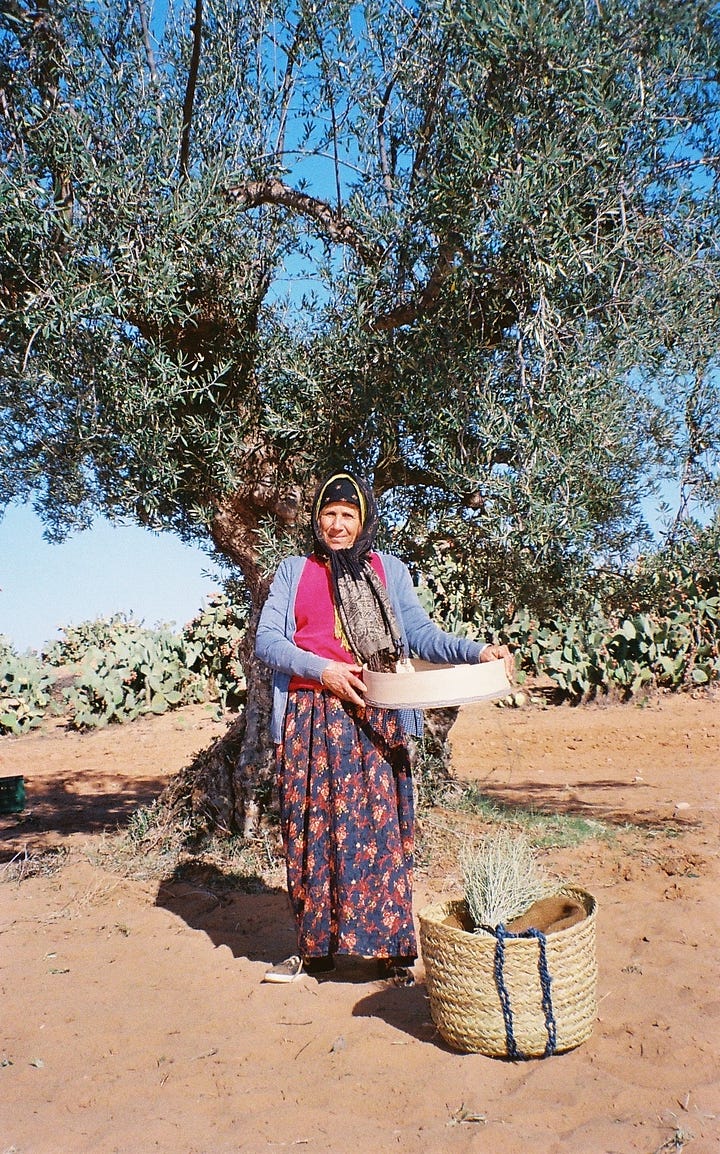
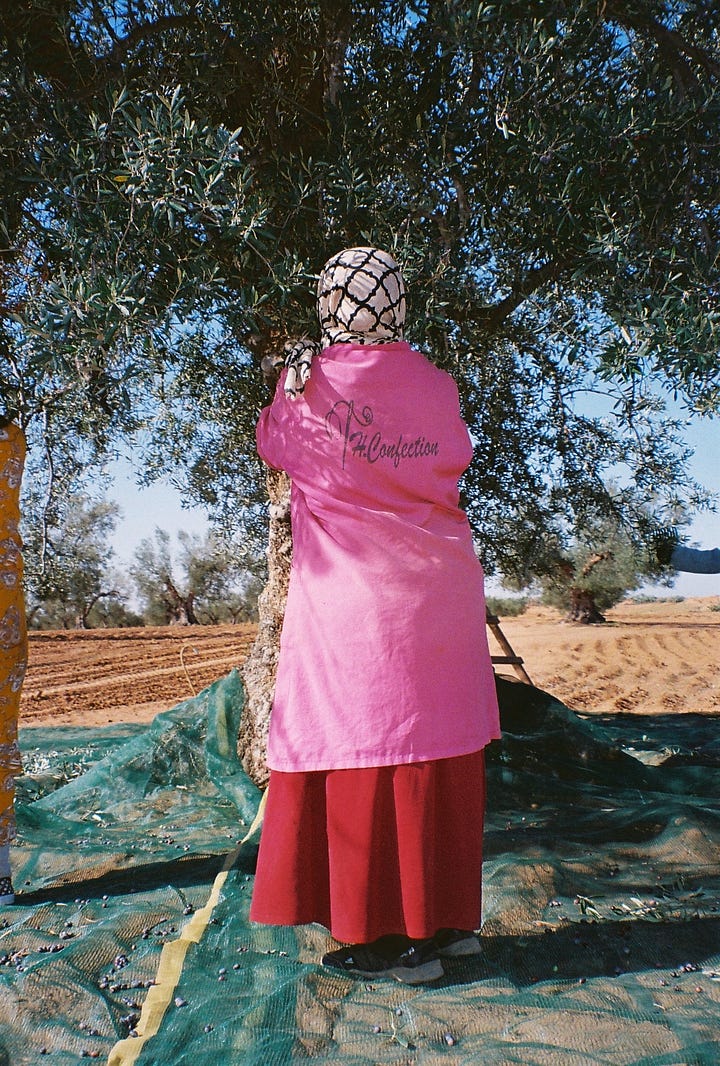
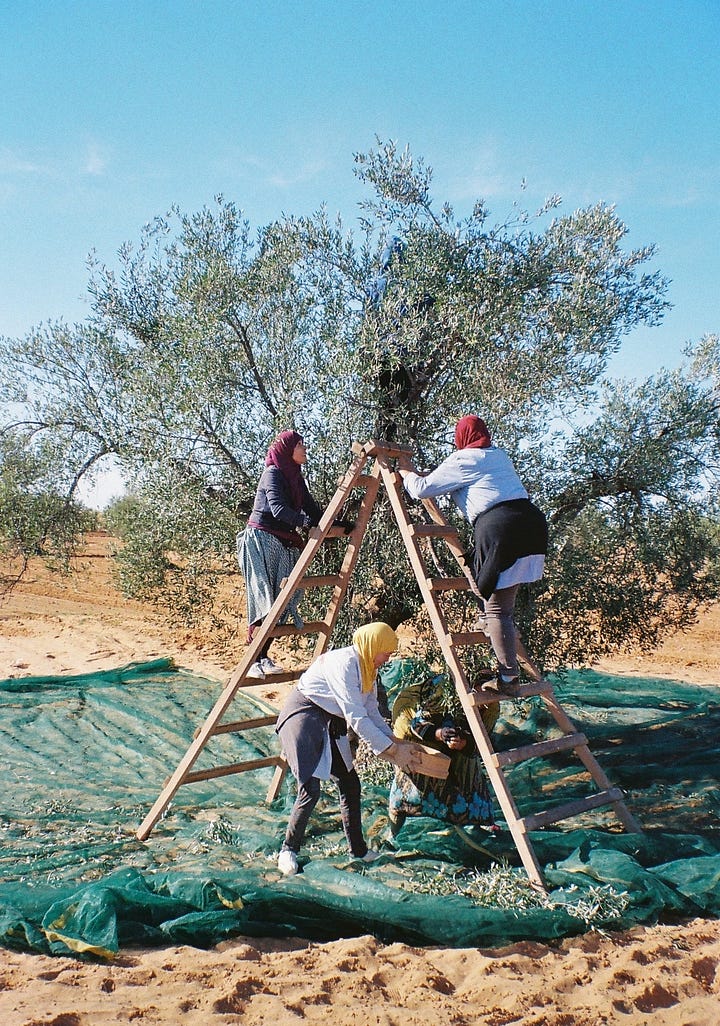
The recipe for great olive oil
You don't need a Ph.D. in chemistry to produce olive oil. But you need to be very rigorous about your practice. To make olive oil, you need:
Healthy olives. Our trees are centennial now. They’re an amazing local heirloom variety called Chemlali that are purely Tunisian and climate-resilient.
To harvest them at a good maturity. There’s not a perfect maturity, as it’s more a personal preference, but there’s an optimal maturity: mid-season when the olives turn from green to purple. This is when the polyphenols reach their highest levels.
A mill with clean machines.
To extract your oil at the right temperature. At the mill, a temperature below 27 degrees is mandatory to produce extra virgin olive oil.
To stock it in good stainless steel tanks.
That’s pretty much it. Not rocket science, but a lot of hard work and super long days.
Business owner vs ambassador
I was never a ‘business person’. I remember when I applied to university, my older brother was like, Maybe you should study business. I looked at him like, Business? Why would I ever do that? But now that I have a business (and more maturity), I understand that ‘business’ isn’t only this or that. I can define what being a business owner means. I also see it as my duty to spread the message about Tunisia. This is how I feel most useful and how I find purpose in my life. It’s what fulfills me much more than just the pure money aspect aspect of it.
The weight on your shoulders
I don’t think we speak enough about the mental health dimension of owning a business. My days are overwhelmed with communicating with suppliers, overseeing the brand, micromanaging exports. Every time something big happens, I need to be on it. My sleep has become worse. The food I eat is less healthy. I’m more stressed. It’s sometimes hard to disconnect. When you’re young, when you’re a woman, and when you don't really know what you’re doing at first and just trying to figure it out… it’s not easy. And it’s a big sacrifice. I know I could have been in a more stable situation if I was working at a company with a regular salary. I’m not as safe as my friends who have a typical 9-to-5. I don’t know what could happen to me or the business.
From control freak…
In Tunisia things are often a bit messy. There’s a fair bit of micromanaging on my part because so many people are involved. I have to micromanage customs, micromanage the transport companies. A single piece of wrong paperwork can make a whole export canceled. Sometimes they’ll write KAÏA with the Y, for instance—if you don't make sure small things are right, it can cost you thousands of euros. So you need to be on it. No little detail can be ignored.
…to zen master (well, eventually)
I’m proud because I've learned a lot of complicated things in a very short period of time. So while it’s brought stress, I’m slowly learning to detach myself more and accept that I can’t control everything. If something is meant to happen, it’s meant to happen! I’m just really happy and excited to be doing what I’m doing right now. What I ultimately want to do.
I see it as a lifelong project.
And it’s just the beginning.
Go deeper… Sarah on IG / KAÏA on IG / Buy a bottle of KAÏA / Courier case study
—
UNTIL NEXT TIME,



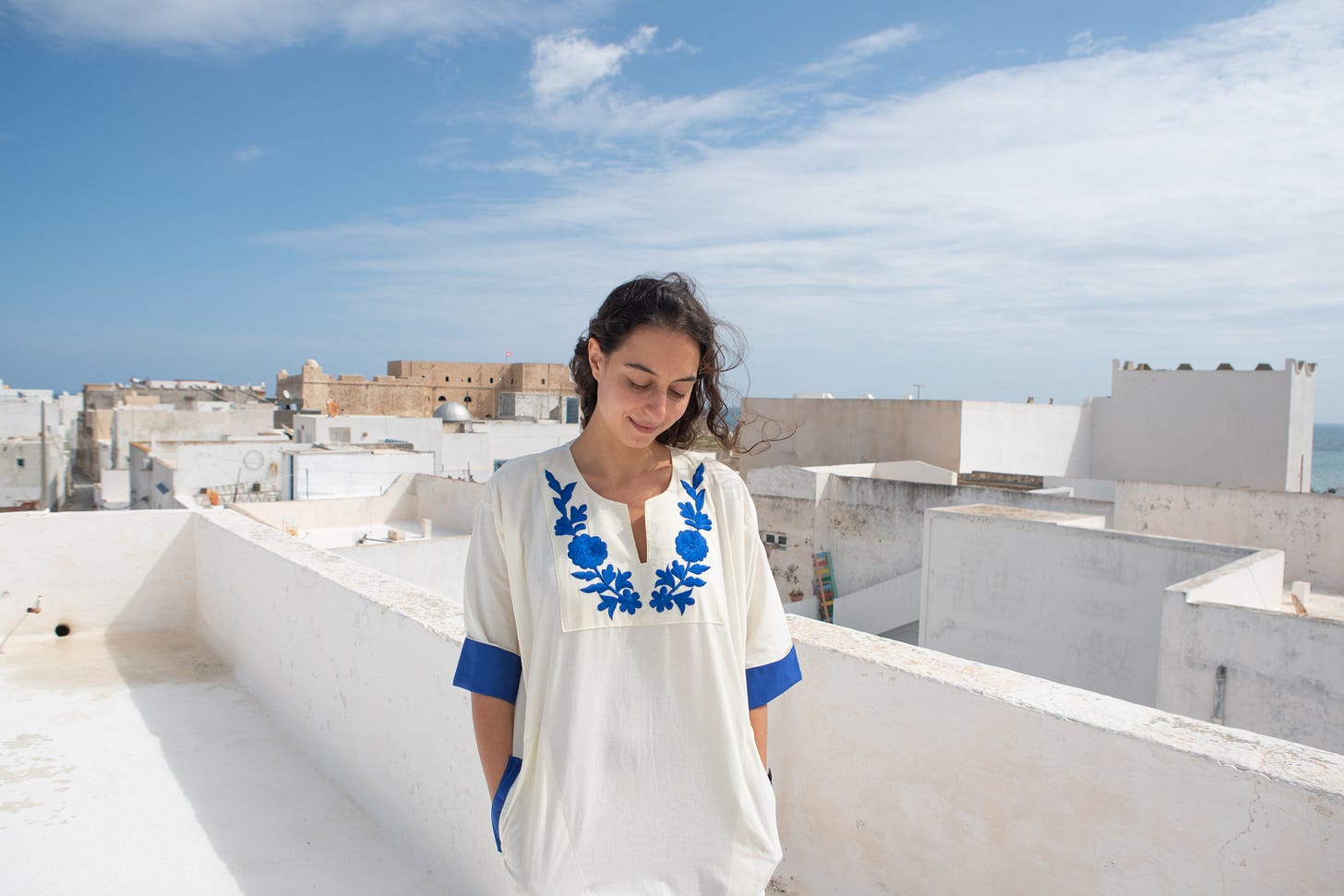





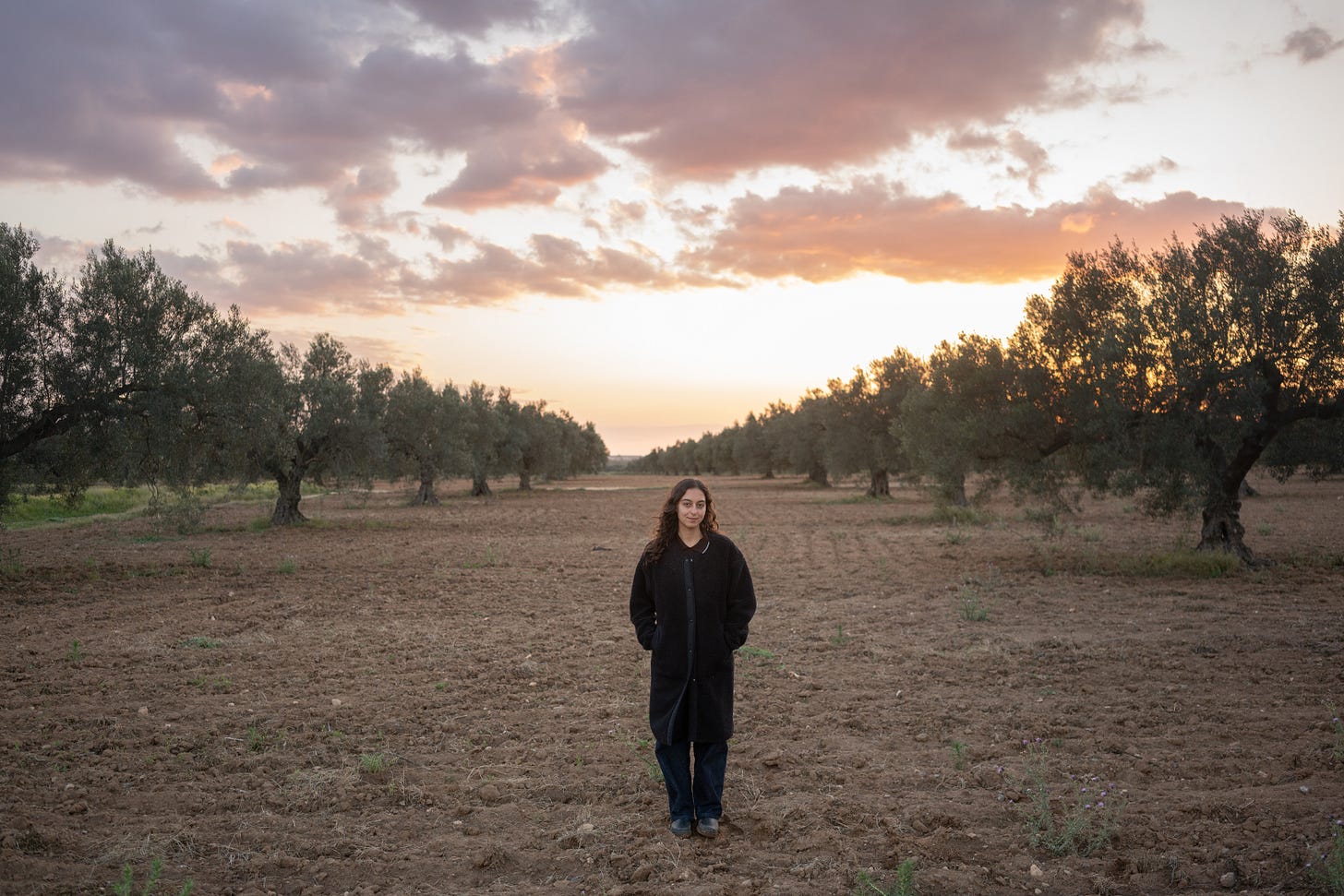

Inspiring in so many ways - as someone who loves people taking unusual career paths, and as someone who wants to be an olive oil girlie!
what an inspiring journey. will definitely try it out ⭐️